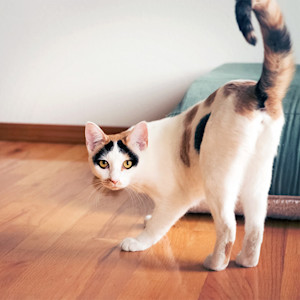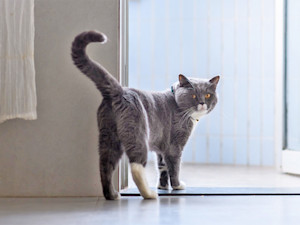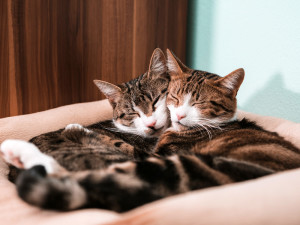Do Female Cats Spray?
Ew, and also: Why?

Share Article
In This Article:
Do Female Cats Spray and How to Identify It? Why Do Female Cats Spray? Do Female Cats Spray After Being Fixed? How To Stop Urine Spraying
Cats do a lot of incredible things — purr, snuggle, chase our hair ties around the living room. We love them with all our hearts. That doesn’t mean they don’t come with challenges. One of those can be spraying.
There’s so much misinformation about cat spraying, and specifically female cats spraying. In this article, we’re going to uncover what your female cat might be trying to tell you with their spraying and what you can do about it.

Do female cats spray and how to identify it?
Yes, female cats can and do spray — inside and outside. There are many reasons for it, which we’ll cover a bit later. But first, can you tell the difference between spraying and peeing outside the litter box?
Peeing is emptying the bladder. Spraying is about depositing scent and pheromones. While there can be some overlap — cats will pee, and even poop, to spread their scent — you typically see body language and location clues when your cat is spraying.
Spraying usually (not always) happens vertically, on walls, furniture, and other upright surfaces.
Your cat will usually (not always) back up to the surface, standing with their backend high, and spray back as opposed to down.
Their tail will often be pointing up and quivering.
They may knead with the back paws.
They may sniff around before spraying, but probably not after because they know they’ve just deposited their scent.
They aren’t going to try to cover the spray spot because they want the scent to remain strong.
Why do female cats spray?
Now that you’ve confirmed your female cat is spraying, let’s figure out why.
Spraying is an instinctual reaction to a situation or emotional state. This is something that was programmed into your cat’s DNA thousands of years ago. While it’s awful for us, it’s completely normal and reasonable behavior from your cat’s perspective.
This is why it’s so vital to try and find the reason for your cat’s spraying. Then you can work on changing the situation or emotions, so your cat doesn’t feel that instinctual need to spray.
They are in heat.
If your cat isn’t spayed (also referred to as being “fixed”), or has an incomplete spay (where not all of the reproductive organs are removed), they can go into heat. Spraying is common at this time to communicate to males that your cat is in season and receptive to mates.
They are territorial.
Cats use scent as a key form of communication. Spraying is one of the more obvious methods. There’s no mistaking that smell. That makes it a great way to let other cats know this area already has a feline tenant. It can even help communicate what time of day your cat was there. A stronger scent tells other cats your cat was there recently. A lighter scent means your cat hasn’t been there to refresh their scent in a while.
Even an indoor cat seeing other cats outside may spray inside to mark territory. It’s a precautionary tactic to make sure those outside cats keep their distance.
They are experiencing fear, anxiety, or environmental stressors.
Scent marking isn’t just about talking to other cats. It can also help comfort the cat who’s spraying. It’s soothing for cats to be surrounded by their own scent. Any stressor, from adopting a new pet to having a baby, can cause stress that can lead to spraying.
The stress of medical issues can also trigger spraying. It’s your cat’s way of letting you know something is wrong.
They have litter box issues.
While a cat isn’t likely to spray because of an issue with the litter box directly, there could be litter box-related stressors at play. For example, your cat doesn’t feel safe using the litter box, gets stalked by your new kitten, feels pain from arthritis when they jump into the box, or other stressors can lead to stress spraying.
They have lower urinary tract symptoms (LUTS).
LUTS refers to various urinary issues, from infections to stones and other medical conditions. Any of these can cause discomfort, leading to stress. We know a stressed cat may spray to self soothe. These, or any medical issues, are common spraying triggers.
Do female cats spray after being fixed?
Yep! This is a myth I hear often. Many people think a spayed female won’t spray. Unfortunately, it’s just not true.
Going through a spay procedure only addresses one of the reasons cat’s spray — going into heat. Post-spay, female cats can still have stress or fear, feel the instinctual need to mark their territory and communicate with other cats, react to the pain of medical issues, etc. So, the act of spraying is still very valuable to female cats, even if they’ve been spayed.
How to stop urine spraying
Hopefully you have some idea why your cat is spraying. Now let’s work on stopping it.
Here are some helpful things to try:
Don’t punish your cat.
No amount of punishment can undo thousands of years of instinct. All it will do is add stress, ruin your relationship, and give your cat more reasons to spray.
Spay your cat.
If your cat is not spayed, that’s the first thing on the to do list. Spaying removes a huge spraying trigger. It can also help with other behavior issues and provide protection against mammary cancer and pyometra.
Get rid of stressors.
If there’s a cat outside causing issues, block your cat’s view out of the windows, and consider a motion activated air can or sprinkler to humanely encourage the visiting cat to leave the area.
If there’s a relationship issue, work on improving it. If your cat is feeling physical pain, talk to your vet about support.
Remove any stressors you can, and use general stress-reducing tactics, like more play and enrichment, bonding time, etc., to help your cat feel more secure and relaxed.
Deep-clean and neutralize the odor.
Step one is to thoroughly clean sprayed spots using a quality enzymatic cleaner. You can do this outside too, if neighborhood cats might be spraying or peeing near doors and windows.
This step can bite you on the backside if you don’t follow through with step two.
Replace your cat’s scent in more appropriate ways.
Step two is putting their scent back. Why? Cats spray to communicate and self-soothe by depositing scent. If you remove their scent by cleaning, their natural response will be to put it back with more spraying.
You can rub your cat with a soft cloth once a day and then rub the cloth around the spraying area. Encourage your cat to rub the area on their own with catnip or by installing a grooming brush on the wall. Put scratchers in the area so they can deposit their scent through scratching. Spritz a pheromone spray in the area a few times a day. All of these are better alternatives for your cat to leave their scent.
Change their litter box set-up.
The litter box probably isn’t the sole reason your cat is spraying. But making sure the box set up meets their instinctual needs as well as possible can certainly reduce stress.
You can also put a high-sided litter box in the area where they’re spraying. Just using the box will leave their scent. And they can spray inside the box if they feel the need. When things improve, you can try slowly moving the box to a better location, if needed.
When to seek expert help
There are many elements to spraying. If you’re not able to solve the problem on your own, consider working with a feline training and behavior expert. We can look for triggers you may have missed and come up with a plan full of tactics to reduce stress, build confidence, and hopefully resolve the spraying.
You should also check with your vet to rule out any medical issues.
Bottom line
Female cats can and do spray, for a variety of reasons — from self-soothing to communicating with other cats, and more.
This is a natural, instinctual behavior. No amount of punishment will stop it.
To change the behavior, you need to find and address the trigger.
When you know why your cat is spraying, you can try simple tactics to remove the trigger, reduce stress, and help them spread their scent in better ways.
Your veterinarian and a feline behavior expert are invaluable resources if you can’t get to the bottom of your female cat’s spraying.
References
“Benefits of Spaying or Neutering Your Cat.” www.preventivevet.com, www.preventivevet.com/cats/benefits-of-spaying-or-neutering-your-catopens in new tab.

LeeAnna Buis, CFTBS, FFCP
LeeAnna Buis has adored cats her entire life and thought she knew them inside out and sideways. But it wasn’t until she worked with a feline behavior consultant that she fully understood how incredible, complicated, and inspiring they really are. She made a career change, starting the certification process to become a behavior consultant right away. She discovered what unique, fascinating, complex creatures cats are and knew this was what she wanted to do with her life — help others on a similar journey to truly knowing, loving, and appreciating their cats.
LeeAnna earned her certification through Animal Behavior Institute, where she received the certified feline training and behavior specialist (CFTBS) designation.
Related articles
When Can a Kitten Be Neutered?
Learn the benefits of doing so ASAP.
![Two women, one with dark curly hair and deep skin and one with pink-blonde hair and lighter skin petting their grey cat]()
Yes, You Should Spay/Neuter Your Cat. Here’s Why
A veterinarian breaks down how it keeps your pet healthy and curbs kitten overpopulation.
![Two tabby cats in embrace lying in cushion.]()
What Are Cat Pheromones and How Do They Work?
Communication is key, and pheromones are your cat’s version of DMs.
13 Reasons Why Your Cat Is Peeing Outside the Litter Box, and How to Fix It
Our experts reveal why this might be happening.
Why Does Your Cat Pee on Your Bed?
It’s a clear sign something isn’t right.
![Male and female cat lying side by side.]()
How to Spot the Difference Between Male and Female Cats
There’s more to it than what you learned in health class.








